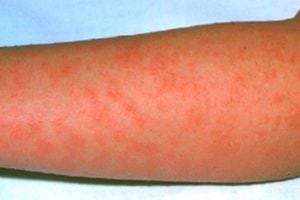Scarlet fever cases in the West Midlands spark warning for parents
Parents are being urged to take their child to a GP if they suspect scarlet fever, after cases rose by nearly 20% in the West Midlands

From September to the end of January, more cases have been reported in the West Midlands compared with the same period last year (369 compared with 309).
There were rises in London and the North West, but some areas saw a reduction.
Public Health England (PHE) urged parents to be vigilant.
A spokeswoman said: "It's not uncommon to see more cases of scarlet fever during winter and spring.
"Although we have seen a small increase in cases this year, scarlet fever is usually a mild illness that can be treated with antibiotics to reduce the risk of further complications and to minimise the risk of its spread to others.
"Scarlet fever's symptoms include a sore throat, headache and fever with a characteristic sandpapery, fine, pinkish or red rash.
"Parents should pay particular attention and if you or your child develops any of these symptoms you should contact your GP for assessment.
"Children or adults diagnosed with scarlet fever are advised to stay at home until at least 24 hours after the start of antibiotic treatment to avoid spreading the infection to others."
Since September, 3,325 cases of scarlet fever have been reported across England.
Between 300 and 400 cases of scarlet fever are being reported every week.
The highest levels are usually seen in March and April. Over the past two years, the total number of cases reported by the end of April has been on the rise.
[breakout title="
What is scarlet fever and how is it treated?
"]
Scarlet fever is a bacterial illness that mainly affects children and is distinctive due to its pink-red rash. It is highly contagious and should be treated with antibiotics.
It usually occurs in children, mostly between the ages of two and eight.
Nurseries and schools are told to try and curb the spread of the bug through encouraging youngsters and staff to wash their hands.
Most cases of scarlet fever clear up after about a week without treatment.
But the NHS says treatment is recommended, and will reduce the time you are contagious and speed up recovery.
The official website says: "With treatment, most people recover in about four to five days and can return to nursery, school or work 24 hours after starting antibiotic treatment.
"Without treatment, you'll be contagious for one to two weeks after symptoms appear.
"Scarlet fever is usually treated with a 10-day course of antibiotics. This is often in the form of penicillin or amoxicillin tablets, although liquid may be used for young children.
"For people who are allergic to penicillin, alternative antibiotics such as erythromycin can be used instead.
"The fever usually gets better within 24 hours of starting antibiotics, with the other symptoms disappearing within a few days. However, it's important that the whole course of treatment is completed to ensure the infection is fully cleared.
"Keep your child away from nursery or school for at least 24 hours after starting antibiotic treatment. Adults with scarlet fever should also stay off work for at least 24 hours after starting treatment."
The NHS also advises patients to drink lots of cool fluids, eat soft food if your throat is painful. Paracetamol can bring down high temperatures, while calamine lotion or antihistamine tablets to relieve itching





